26 December 2006
Link of the day: Open peer review and bad referees
18 December 2006
Quote of the day: A few choice words of Paul Graham
What happens when your mind wanders? It may be like doodling. Most people have characteristic ways of doodling. This habit is unconscious, but not random: I found my doodles changed after I started studying painting. I started to make the kind of gestures I'd make if I were drawing from life. They were atoms of drawing, but arranged randomly.From Paul Graham's essay "What Business Can Learn From Open Source":
Business still reflects an older model, exemplified by the French word for working: travailler. It has an English cousin, travail, and what it means is torture [2] ...From Paul Graham's essay "How to start a startup":
[2] It derives from the late Latin trepalium, a torture device so called because it consisted of three stakes. I don't know how the stakes were used. "Travel" has the same root.
People who don't want to get dragged into some kind of work often develop a protective incompetence at it. Paul Erdos was particularly good at this. By seeming unable even to cut a grapefruit in half (let alone go to the store and buy one), he forced other people to do such things for him, leaving all his time free for math. Erdos was an extreme case, but most husbands use the same trick to some degree.
17 December 2006
Link of the day: Paul Graham essay collection
I haven't had time to read all the essays, but here are a few I like: "Copy What You Like", "How To Do What You Love", and "Good and Bad Procrastination".
I find it interesting to hear what computer scientists and programmers think of difficult, creative, intellectual work.
Link of the day: Hamming on "You and your research"
08 December 2006
Link of the day: Soft paternalism
In other words, the gist of many life hacks is to shape your external world in order to prevent your wanton, short-term thinking self from dictating your actions.
07 December 2006
Radio-controlled helicopter
03 December 2006
What I learned from David Allen
Fortunately, I am already doing most of the things David talks about, just because of my natural habits and because I've been reading 43Folders.
I want to note the new ideas I learned from finally sitting down and reading David's book.
- Top item first - Don't "emergency" sort, that is, pick and choose what you feel like doing first. Work systematically from top to bottom, which enforces discipline.
- Embracing the concept of next-action - I'm really good at getting to "inbox zero", i.e. plowing through all my emails down to a near empty inbox. But I'm bad at doing my real work. So I should make a list of next-actions and plough through them just like they are email. The part that gets me really hung up is trying to do something unbounded. "Solve research problem" is not a next-action, but "try to derive X for 1 hour" is a doable next-action.
- Really doing the weekly review - This means going through all lists (projects, waiting-for, next-actions) and organizing them so that you have a strategic plan for next week
- Higher order planning - David calls nitty-gritty planning "runway" and "10,000 ft." Career goals, life goals, etc are at 30,000 and 50,000 ft. I've gotten proficient at "runway" stuff so now I need to integrate higher order goals into my plans.
02 December 2006
Electronic GTD: Using Backpack
So far I have four pages. 1) Home page - contains next-actions, 2) @projects - mix of project ideas and next-actions for them, 3) @waiting-for - nothing in here yet, 4) @someday - stuff I'd like to do someday when I have time, 5) Weekly review - log of what I've accomplished this week, what I need to work on based on this week's performance, and plans for next week.
27 November 2006
Update II on goals
It's time for some new goals. Stay tuned for a further post.
Tech: Zoom H4 digital recorder
19 November 2006
Quote of the day: Battlestar Galactica, Episode "Hero"
Tigh: Tell you a dirty little secret: The toughest part of getting played is losing your dignity. Feeling like you are not worth the oxygen you are sucking down. You get used to it. You start to believe it. You start to love it. It's like a bottle that never runs dry. You can keep reaching for it over and over and over again.
Adama: So how do you put that bottle away, Saul?
Tigh: I don't know. One day you just decide to get up and walk out of your room.
13 November 2006
The purpose of a clean desk
Link of the day: My outsourced life
07 November 2006
pdftex versus latex
It seems like there are a few advantages to using pdftex over latex. 1) It's faster, 2) Leaves behind fewer junk files (like .dvi and .aux) and lets you go directly to .pdf which is a more modern file format than .ps, 3) Apparently it works better with the hyperref package (hyperlinks inside the .pdf document), 4) The .pdf generated by pdftex is guaranteed to look great whereas you might get an ugly .pdf if you use the command ps2pdf on your .ps output file from latex. The only advantage of latex over pdftex is that there are some packages which are incompatible with pdftex, most notably psfrag.
A short discussion can be found near the bottom of this blog post.
Link of the day: Ode to the afternoon nap
For me, it's important that I take a nap because I'm really tired and not because I'm avoiding work. In the former case, I really do find it beneficial.
06 November 2006
STM images of Co atoms on a Cu (111) surface
I used the STM to arrange cobalt atoms in the pattern of square lattices on a copper (111) surface. They weren't exactly square since the the sites on the copper (111) surface are arranged in a hexagonal lattice. I also used the STM to image the surface. The STM current is kept constant with a feedback loop and the instrument measures the height of the STM at each point on the surface. By scanning the STM over the entire surface, you get a topographic map of the surface.
Here's a square lattice. The image is a 2D grayscale plot with a light source.
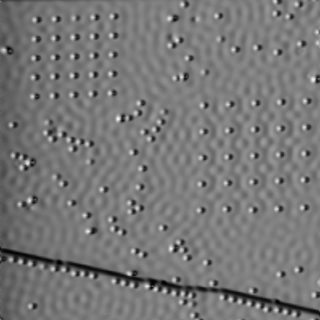
This image is a 3D plot of the STM height with a light source. If you "crash" the STM tip into the surface, you get the "mountain" like features shown in this picture. Sometimes you crash the tip into the surface on purpose in the hope of getting a sharper tip.
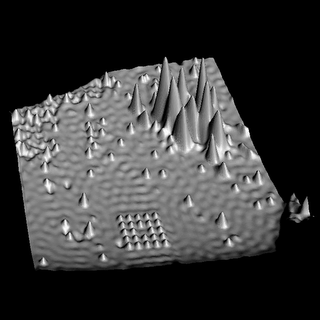
The copper surface isn't flat. There are places where the surface is sheared off to a lower atomic layer, resulting in "terraces." You can see a square lattice (the little bumps) on the top lefthand side of the image (also a 3D plot).
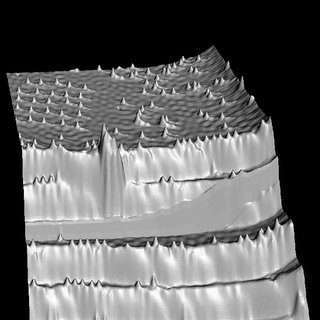
04 November 2006
Physics and philosophy
Personally, I think the categories of objective and subjective are too narrow. There should be some kind of in-between category which values would fall under. I don't think there are any absolute values. There is always an exception to a rule. For example, one of the ten commandments is "thou shalt not kill." But what if I'm being attacked with no provocation? Of course, as C.S. Lewis would say (see his book Mere Christianity), it seems like there are some guiding moral principles that most people can agree on. So values are not subjective either.
My roommate was really interested in how to psychologically deal with the idea that we might all be "brains in a vat." The philosophy graduate student made two good points. First, the question of being a brain in a vat is by definition unknowable. So it seems silly to worry about it. Second, reality should be taken in context. Maybe we are living in a Matrix-like environment and our bodies are plugged into a computer. But that doesn't make our perceptions false. In the context that we perceive, our hands are real, the table when I tap it is real. The idea of context is very natural to a physicist. I don't go around telling people that quantum mechanics is true (in the absolute sense). But when we study phenomena on the scale of atoms, then quantum mechanics is the appropriate lenses to understand these phenomena.
I have mixed feelings about philosophy. On the surface, it seems like a fascinating topic. But at the end of the day, when you twist and turn your brain, you don't feel like you've learned anything. I think philosophy focuses too much on finding absolute truth and thus sometimes gets sidetracked from the practical matters of living -- which is the reason why I'm interested in philosophy in the first place.
03 November 2006
The great file cleanup
I'm at least halfway through cleaning up all the files on my hard drive now; all the non-physics stuff has been organized. During this process, I have been thinking about a good file naming convention. There were some suggestions I found on a previous post.
For articles, I try to use the convention author_name-article_title-publication_name-year. If the title is vague or unhelpful, I'll rename it. I prefer using dashes as opposed to underscores because they are easier to read and because they are easier to type (no shift key).
I also tend to create a lot of folders. The folder names can be quite descriptive and serve as a poor alternative to tagging. I'm trying a nested file directory structure. For instance, I use a small number of super-folders called "culture", "work", "computing", "lifehacking", etc. Each of these super-folders contains more directories.
Folders and long file names seem a bit archaic and tedious, but at least you can count on them being robust and dependable for years to come. Also, they are OS-independent which is nice if you use more than one OS.
01 November 2006
NHL Google Video
Rebooting
That's why when I have a bad day, I like to take the night off, go to bed early, wake up at 6 am the next morning and go to the gym. It helps me get a fresh start again. I call this process "rebooting."
31 October 2006
Learning to deal with failure
I've alluded to my own personal turmoil in this blog, but I'm writing about it directly for the first time. I don't want to get into details but a couple years of extreme pressure and stress got to me. Shortly thereafter, I had to deal with a family crisis. I couldn't work or sleep for a very long time.
My self-respect and confidence sunk to an all-time low. I'm at a new place now and people don't know the formerly exuberant, confident, academic superstar me. What am I supposed to say to them? Yeah, I think I'm a good person who fell on some hard times and you just have to believe me? I get sick of making excuses anyhow. I know some of my colleagues are losing their patience.
I count all the times I missed a class or seminar I should have been at, when I let my advisor down, when I stayed away from my friends, when I missed someone's retirement party, etc. The memory of failure itself becomes a burden. Sometimes I just feel helpless and want to stay in bed.
Life has improved dramatically, but it's a continual struggle to get back to where I used to be. I seem to improve and then I hit a plateau and have to fight to get up the next hill. This is the part that is draining and perhaps surprising for me -- thinking that it's finally over, but realizing I still have more work to do.
I'm finally at the point where I'm feel well enough that I can chip away at both the things I should have done and what I should be doing. However, it's daunting to look at the pile of things I hoped to accomplish and remain undone. This burden makes it difficult to focus on what I should be doing now. I know I should burn some bridges and forge on, but I'm reluctant to do so. And there is the question of pace. Should I take a break and relax now and then? Should I go all out and power through my troubles? I don't know what I'm capable of anymore.
It's difficult when I have a bad day or when I can't sleep because I begin to fear that the nightmare will begin again and I start to give up again. I have to tell myself, "No, that's over. It's just a bad day and only that."
I think about the future me five years from now. I don't think I will regret helping my family. I do worry that I'm not keeping a positive attitude, that I'm not trying hard enough or that I'm dwelling too much on failure (I never know which to think) -- and that is going to cost me five years from now.
I make it sound like I'm depressed, but really the dominant feeling is frustration. I'm writing this entry in the hope that it will help me soldier on to the better days that await me. I want to get up every day and do my best. I think that's the most anyone can hope for -- not to be bitter, not to expect happiness or success -- but to do my best and earn my own respect and in doing so be content with that.
30 October 2006
Link of the day: How to ruin your academic career
On this blog, I'm trying to stick to the convention of only criticizing myself and the vague selection of mankind whom I don't agree with.
29 October 2006
Staying connected?
Link of the day: Four reasons why parents don't support their children's dreams
26 October 2006
Link of the day: File naming conventions
Recently, there has been some discussion on 43Folders and Lifehacker about file naming practices.
17 October 2006
Link of the day: Scrapbook and cosmology calculator
After learning general relativity, I now have a passing interest in cosmology. Today I found out about a web-based cosmology calculator which "computes times and distances as a function of redshift for user-defined cosmological parameters."
13 October 2006
Link of the day: Explanation of condensed matter
12 October 2006
Link of the day: High dynamic range photography
Productivity: what's been working
Getting up and going to sleep at the same time every day. This principle is the bedrock of my schedule. I like to get up at 5:30 am, go to the gym at 6 am, and be at work by 9 am. But if I get up at 5:30 am, I have to be in bed by 9:30 pm. I've been much less consistent in going to bed on time than waking up on time. I really like the fact that from 5:30 am - 10 am, the world is quiet. No emails or problems to deal with until the rest of the world wakes up. However, one problem with this strategy is that sometimes I don't get enough sleep during the week. I may experiment with a sleep-in holiday on Saturday mornings.
Going to the gym at least four times a week. Going to the gym just helps me feel relaxed and energized so I can begin my work day fresh. Also, I feel like it's a good way to set the tone for the day. If I can get up early and go to the gym in the morning, I can do anything. A workout done is an accomplishment I can be proud of.
Recording timecards. This procedure keeps me honest. I look at the timecard and see "wow, I did really well today" or "gee, today was not good." As I fill out the timecard during the day, I'm aware of when I'm working and goofing off. I use timecards with the following format. Take a 3" x 5" index card and write the date at the top. With the card oriented vertically, I write down times in half hour blocks ("5:30", "6:00", "6:30,"..."12:00", "12:30",..."9:00"). Then periodically during the day (especially when I have interstitial time), I fill out the card.
Keeping a blog. It's useful for both work and personal reasons. Writing things up helps me reflect on my progress in work. I also like writing up trip reports (like hockey camp) so that I have a diary-like report of important events in my life. Some of my friends have become regular readers of my blog, so it's a good way to keep in touch (but unfortunately, a one-way method unless the other person has a blog, too.)
Applying GTD principles in my email account and online calendar. I've written about these ideas before in my blog, so I won't go over it again.
Minimizing transition time
Today, I noticed that I waste a lot of time transitioning between tasks. So I want to make a few additions to my strategy. First, I want to pack my backpack right before I go to sleep. Today, I forgot a book that I needed and had to go back home to pick it up. Second, I want to implement a GTD text file for my various projects. Each project (research, class 1, finding cheap tickets for the opera, etc) will have a bunch of tasks. I want to order them by priority and perhaps note the length of time it will take. Tasks should be done depending on the chunk of time available and priority. Some good resources for a todo.txt file are todotxt.com and Gina Trapani's Lifehacker article "List your life in .txt. If I have a list of tasks, then I don't have to waste time figuring out what to do next. Also, if I have a master list, I can keep an eye on my global progress, rather than just thinking about each project separately all the time.
Sony Reader
11 October 2006
David Mermin on talks
The most important question to ask yourself in preparing your talk is why on earth any physicist might be interested. This is dangerous: There is always the risk you will find no answer. But that is not necessarily a cause for alarm. Often when working on a problem for a long time, one does indeed forget what first led one into that line of endeavor, so if at first you can find no answer, think some more. What is there in the subject to capture the imagination of one lacking your highly specialized skills? Give yourself a week. If you still can find no reason why anyone not directly involved in the work should find it anything but tediously obscure, then you should find something else to talk about. Indeed you might then seriously consider finding another area of research.
It's taken from a Physics Today article called "What's wrong with these talks?" by David Mermin.
Caffeine overdose
10 October 2006
One page per day
Writers have come up with various ways to combat procrastination. According to a friend of mine, Ernest Hemingway wrote one page everyday even when he had a hangover. Another writer wrote four pages a day after which he could polish all the silverware he wanted.
I want to come up with a physicist version of this method and I have arrived at the following proposal: do one hour of research every morning.
09 October 2006
Where does my time go?
Fun: Battlestar Galactica (1 hr), Lost (1 hr)
Exercise: hockey practice (3 hrs), gym (6-8 hrs)
Class: Noise and dissipation lecture (3 hr), Theory of Solids reading group (1 hr)
Meetings: Meeting with advisor (1 hr), postdoc meeting (2 hrs), group meeting (1.5 hr), condensed matter theory seminar (1 hr), physics colloquium (1 hr)
Sleeping (56 hr)
Eating (21 hr)
News reading and email (??)
Which leaves me 67.5 hours during the week to do "real" work. My real work consists of doing reading for classes, attempting problem sets, reading the arXiv, doing research, and organizing my research/class/etc materials.
I'm going to start keeping time cards everyday to see what's going on.
08 October 2006
Limits on addictive behavior
I have a sort of flow chart to fighting off sleepiness. Caffeine --> exercise/news reading --> email --> web surfing/gaming --> napping. (X --> Y means if X doesn't work, do Y)
Link of the day: Math screensavers and exercise videos
Handedness in hockey
I'm right handed and I shoot left. When I first started playing hockey, I shot right, but the coaches made me switch to lefty. They said I stickhandled and passed better. I'm not sure if they were right (in fact, I wasn't very happy about the switch), but now I just play lefty all the time. Unfortunately, I don't have a strong upper body so I find it difficult to shoot lefty. My shot is definitely stronger with my right hand on the bottom of the stick.
07 October 2006
Don't tell me what I can or can't do!
Ever since I reached college age, I feel increasingly pressured by the ever-growing cacophony of voices telling me to do this or that. When I got into graduate school, it seemed like everyone had an opinion on where I should go. One professor wanted me to learn his specialty, so he pushed me towards the school best for that. Some people thought I should go to a "brand-name" school to maximize my marketability. A few people apparently didn't seem to think I was very bright, since they didn't really encourage me to apply to top schools. If I had to do it over again, I'm not sure I would have told anyone where I got it unless they had some useful advice. As one of my friends aptly said, "I am not a democracy. You do not have a vote on where I go to school."
Career advice, I can partially understand that. But I see so many other areas in life where people are ridiculously obtrusive. For instance, I used to have short hair up until a year and a half ago when I just stopped cutting it and let it grow. A few months ago I contemplated cutting it and I felt so much social pressure not to. My roommate said, "I know it's tempting, but don't cut your hair!" I get noticed by men much more now that I have longer hair and it makes me feel like I must have been less of a woman when I had short hair. (If you're wondering, I've decided to keep my hair long for now, so I can get more experience with the situation before making a choice.)
Something that really annoys me is when people tell me I work too much. I talked to all my friends who have gotten good jobs in physics and they all worked like crazy. No one can be successful in science without working long hours. I often feel like I have to cover up my working habits as if I were an alcoholic. It is true that there have been times when I've worked to escape from personal problems, but mostly I have had very good reasons for working. I studied very hard in college and I have no regrets. It was like intellectual first love; I didn't want to lose time when I could be learning something beautiful. Now that I look back, I was right. I can't go back to learning Nyquist's theorem or the Schrodinger equation for the first time. The question is not what do you want to do with your life, but what do you want to experience (as Steve Pavlina says).
I think about what I could be doing besides physics and I can't see that the alternatives are any better. Lawyers work really long hours and a lot of that work is apparently boring. Doctors have trouble running profitable practices due to the rising costs of malpractice insurance. Being an engineer in a high-tech company seems really boring. One of my friends ia biomedical engineer and she showed me her workplace -- a maze of cubicles. Frankly, her co-workers seemed un-interesting and lethargic. I can't imagine being a bright, creative person stifled in that type of environment, having to do what is expected. Everyone has a different focus in life. Some people want to create a wonderful family. Some people want to buy their own island and yacht. Some people want to "save" the world (charity work). I want to work in a creative, meaningful craft (at least that is what I want now). Some people want it all - a great family, great work, and money!
What really bothers me is who's telling me what I should do. One group is my peers. "Don't play video games. They're addictive." (My response: "Well, they make me happy because I feel like a kid again!") "I'm almost 30. I'm getting old." (My response: "Speak for yourself. No one's stopping me.") How can a 25 year old claim to be old?! The other group is parents and elders. I suppose that an occupational hazzard of growing older is wanting to tell younger people what to do because 1) you no longer have the opportunity to make those choices and 2) a sense of entitlement. I don't believe that older equals wiser. Many people don't get wiser; they just reinforce the same beliefs they've had since they were 20 years old. I don't see why a 60 year old person who treads a narrow path should be respected more than a 30 year old person who has tried to make the most of his/her short time on this earth. I refuse to be put down anymore. Don't tell me what I can or can't do.
06 October 2006
Worker bees
The only recreational activity I might be able to reduce is news reading (which probably consumes 1-1.5 hours a day). Steve Pavlina views reading the news daily as an addiction. I used to read a lot of articles in depth, but now I skim headlines and just pick about 10 articles to read. I used to spend a lot of time organizing and cleaning, but I don't have to do that anymore, just a little maintenance now and then. The other fun things I do are hockey and watching two TV shows and I don't really want to give that up.
04 October 2006
Living efficiently
I think I've been doing a good job during the week. There's a good balance between doing research and studying for classes ("real work"), attending classes, seminars, and meetings ("meta work"), going to the gym ("health") and watching TV shows and playing hockey ("fun").
I find that I have problems on the weekend because it is a huge chunk of unstructured time. There are no constraints on my time, no group meeting at 1 pm, no hockey practice at 9 pm, etc. Last weekend, I tried to sit in my room and work, but that just failed. I can't concentrate that long. But I really need that un-interrupted time to do work! What to do?
I'm going to try two things. First, I'm going to go to the gym on the weekends. Physical exercise gives me a mood and energy boost. Second, I'm going to plan on taking 1/2-1 day off every weekend. I'm not sure yet what I'll do with that time, but the point is to have something to look forward to at the end of the week.
After I decide on a framework for my weekly schedule, I will do some fine-tuning. In some future blog post, I'll write about logging how I use my time and making sure I work N hours per week.
02 October 2006
Link of the day: X-Gals
Physics RSS feeds
01 October 2006
Report on goals for September
- Replenish emergency cash fund - I am getting better at putting off unnecessary, spontaneous purchases. I get the bulk of my large bills in the fall, so I'm trying to wait until January to splurge (if I still covet those purchases then).
- Eat more fruit and vegetables - I am making a conscious effort to eat more fruit. I think it would be a good habit to eat some kind of fresh fruit at breakfast every morning.
- Read David Allen's book Getting Things Done - nope
- Organize electronic files - nope (that is a gargantuan task)
- Work out at least four days a week - I'm not quite there yet, but I've worked my way up to three days a week. I had a major deadline this past month and skipped the gym a lot the first two weeks in September.
- Start reading Physical Review Focus consistently - yes, it's in my Bloglines news reader now.
30 September 2006
Link of the day: Degree of difficulty
I've caught myself sometimes thinking, "Heck, that job doesn't seem too hard. I bet I could learn how to do it well in a month." If the work is partially related to things I've done before (organization, technical, etc.), that seems legitimate. But there are aspects of life I have very little experience. For instance, I would be a horrible psychologist without a lot of practice. At one time, I thought, "Hey, all you have to do is sit there and listen." But you have to get into another person's head, which seems nearly impossible if there is no cultural/background overlap between the two of you.
Being an expert psychologist, wood carver, children's book writer, circuit designer, violinist, surgeon, theoretical physicist -- all those things are an art. It takes a long time to understand the subtleties, but that's what makes it fun. A mentor of mine from college says that he finds theoretical physics a bit impersonal, but he keeps do it because he loves the "craft."
The craft is what made me consider a career in the academy. As a professor, you have the challenge of research, of course. But there is also the challenge of teaching to students who don't know anything about your subject and the challenge of mentoring students to become critical thinkers and possibly future professors and scientists. So even if you master one area (say teaching), you can still work on research or mentoring. Perhaps the more realistic scenario is that you discover you suck at research and decide to hone your skills in teaching instead. I haven't even covered the area of administration. You could also hone your craft in leadership: running a happy, effective research group, hiring faculty, being chairman of the department, etc. The university is a rich, diverse, vibrant place and there are immense opportunities for changing your career focus.
21 September 2006
Digital audio recorder: Roland Edirol R-09
Editing TeX in text editors
Free break reminder software for Windows and Linux
16 September 2006
What programming languages should a theoretical condensed matter physicist learn?
04 September 2006
One hour a day
I have decided to start reading one hour of physics a day, with the requirement that the material has nothing to do with my research and that it be fun!
Currently, I am reading Gravity: An Introduction to Einstein's General Relativity by James Hartle. I'm hoping that this text will give me a better intuitive feel for GR and teach me about the landmark experiments in the field.
31 August 2006
Travel plans
- Philadelphia
- Providence
- Newport
- Upper State New York
- Montreal
- Arcadia National Park
- Cape Cod
- Martha's Vineyard
- Chicago
- Seattle
29 August 2006
Intentions
What a simple, but powerful idea. If we just thought about what we wanted to do instead of dithering around, we could accomplish so much more.
In the spirit of Steve's idea, I will publicly declare my intentions.
- I will be happy and optimistic all the time. (I've had a lot of downs in the past few years.)
- I will become a stronger, healthier, more athletic person. (I feel fit, but I want to do better. I would like to become a better hockey player.)
- I will become a theoretical physics professor at a first rate research university or liberal arts college. (The first step is to do an outstanding thesis project.)
- I will become more informed about physics, both past developments and current research.
- I will meet and befriend new, interesting people.
- I will become closer to my parents and develop a stronger rapport with them.
28 August 2006
Heartland hockey camp
The camp is run by former US Olympian and NHL player Steve Jensen. I arrived at camp late on a Saturday night. Waking up Sunday morning, I got a good look at my new surroundings (rural northern Minnesota). The camp is completely devoted to hockey -- comprising of a dining hall, administrative office, dormitory, rink, power shooting range and recreational facilities (tennis court, roller hockey court, and lake).
This is the room I woke up in. Yeah, the dorm rooms were sketchy looking, but servicable.

The interior of the dorm was decorated with photos of Coach Jensen from his Olympic and NHL days, as well as a few junior teams he's coached.

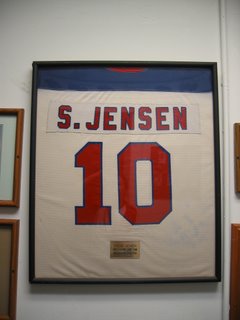
Besides Jensen memorabilia, I saw appropriate NHL decorations on the dorm walls.
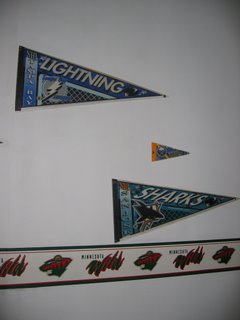
The walls were also covered in motivational sayings, particularly in the weight room. A bit hokey, but cool.
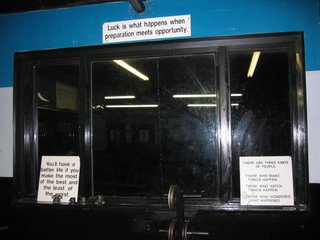
We campers ate all our meals in the dining hall attached to the dorm. The food was actually pretty good.
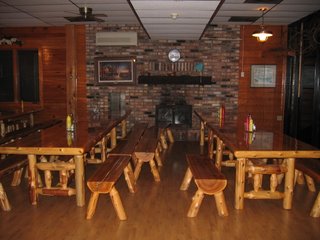
I then explored outside. This is what the dorm exterior looks like.

Just a few steps from the dorm, the rink!
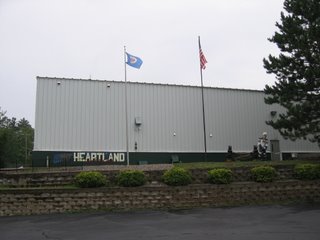
A closer look at the statue in front of the rink (the hockey player even has stitches on his forehead.)
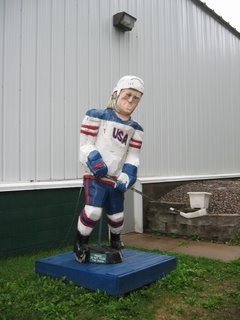
I guess if you are bad, you will be eaten by the "Heartland security guard."
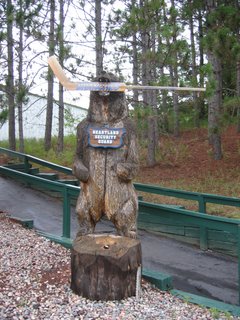
There is a power shooting range next to the rink. We went there every morning to practice our wrist shot, backhand, and slapshot.

In case you still have energy after skating 3 hours a day, you can play roller hockey.

If you only have a little energy, you can play mini-golf.
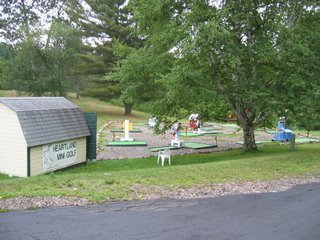
I heard that there was a lake across the street from the camp. So I walked over. On the way, I passed this sign (unfortunately I forgot my ID).
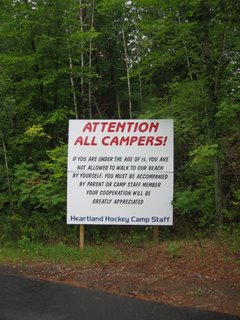
The lake was well stocked with toys and boats. You can go fishing in the lake and even water skiing.
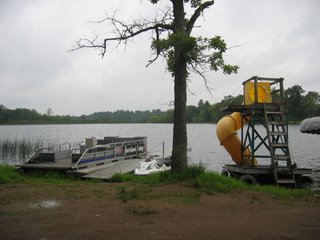
In the distance, you can see the "ice berg." It has handles on the side so you can climb up. At the beach, there is a sign listing a bunch of rules, including that you are not allowed to play "king of the berg."

Yes, that is a water slide. I watched a fellow camper go down it three times. I hate swimming, so I acted as "life guard."
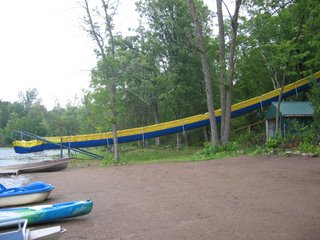
So this is the bizarre, whimsical place I ended up in for my one-week vacation. It was essentially a kids camp for adults. But that was fine with me, after all, I still play Mario video games. I was the youngest person there (most people were in their 30s and 40s), but everyone was young in spirit.
There was no TV, one modem connection for internet access (provided you brought a laptop); all hockey all the time.
For five days (Monday through Friday), we honed our hockey skills. The 50+ campers were divided into a beginners and advanced group (I was in the beginners group). A typical schedule was wake up at 8 am, breakfast at 8:30 am, power shooting practice at 9 am, an hour of ice drills, lunch, classroom video review for an hour, another hour of ice drills, a one hour break, and a one hour scrimmage. (The schedules were staggered so that one group would be doing power shooting while the other group was doing ice drils, etc.) Then we had dinner at 6 pm and afterwards you could go skate and play more hockey if you wanted! Some nights I did work on more hockey skills, but other nights I went to the bar and hung out with my fellow campers (yup, there is a bar inside the rink, overlooking the ice -- kind of surreal drinking beer and watching people playing hockey).
I'll try to describe some of our workouts. Power shooting was focused on learning good form. The mechanics in all hockey shots are basically the same, but it is unbelievably hard to do everything right simultaneously. You have to plant your feet correctly, flex the stick blade, transfer your weight, and aim all in one motion. I have the most trouble flexing the blade and I was frustrated that my shots were always low (everyone says that's a good thing, but lifting the puck definitely looks cool). We had our shots video taped, timed with a radar gun, and evaluated in the classroom. There was one coach (Jerry) whose job was to do all the video taping and photo shooting.
Our ice training sessions were intense (see this page for video examples; the closest example to adult camp would probably be bantam camp). Coach Jensen outfitted his rink with an audio system so that up to two coaches can wear a headset and everyone can hear their instructions all over the rink. Yup, that means that we would hear Jensen screaming "No, we do not go to the net with one hand on our stick" or the coach would tell me "you forgot to do your backwards crossover" and all the other campers would overhear. We had a great ratio of 4-5 campers per coach, which meant we got a lot of personal instruction. Some of the drills I had seen before, but there were quite a few new ones. There was a lot of emphasis on forward-backward transitions (change the direction you're moving without changing the way your body is facing). I had the most fun doing the obstacle course which involved jumping over a hockey stick and sliding under another.
Jensen had quite a few contraptions for improving our stickhandling. One was the "triangle." You had to stickhandle through the triangle, using the toe and backhand of your blade. Another was the "poke checker." It's a teepee that has a puck hanging from a string. You skate up to it and poke check the hanging puck. We also used this thing that looks like a bridge. You skate around the ice (sometimes backwards) and then have to push the puck underneath the bridge.
Coach Troy had a few evil drills. One was the leg burner (you drag your skate edge across the ice). Another was bouncing the puck off your inside and outside edge and picking up the puck with your stick (umm, that's practically impossible?). Troy also had us do some power skating stuff that I had seen before.
Coach Jerry came up with a lot of "fun" drills. For example, all the players would skate from one end of the rink to the other while four poke checkers would try to take their pucks away. Another drill was the classic "monkey-in-the-middle." Jerry even had us all take penalty shots on the goalie at the end of practice.
In the beginning of the week, we mostly worked on skills -- skating and stickhandling. It was exhausting because Coach Jensen would have us rotate through 5 or 6 stations. The idea of using stations was certainly efficient since all 20+ of us campers were skating the entire hour and getting an exhausting workout. In the middle of the week, we progressed to half and full-ice drills. I was a bit disappointed with the inevitable standing around that comes with these drills, yet relieved to get a bit of a break. We learned some basic tactics including cycling and the triangle offense. Coach Jensen got a little frustrated with our lack of fundamental tactical understanding (we were embarassingly bad at times), but he was extremely patient, gently progressing from 1-0 to 2-0 to 1-1 to 2-1 to 3-0 and 3-2 read-and-react drills. When we did a good job, he would yell "A+!" into his headset.
Each day would end in a scrimmage. The first few scrimmages were a riot since they were video taped by Coach Jerry and "commentated" by Coach Jensen. I remember our very first game, I had the puck and Jensen yelled into his headset "shoot it!" Kind of bizarre that he was telling my opponents what I would be doing. At the end of a terrible defensive play, Jensen stopped the action and had us watch an "instant replay" on a gigantic projection screen in the rink (nicknamed the "Jumbotron"). I've never played a game where the coach yells "Get back! Get back!", "Oh come on, you've got to put the puck on the net" and you can hear his voice amplified all over the rink. Definitely a bizarre experience, but very educational.
On the last night (Friday), we had a fancy meal with prime rib and other delicacies. Coach Jensen even served us wine! If that wasn't enough, after dinner, we enjoyed a bonfire (soaked in beer of course). This is what the bonfire site looks like in the daytime.

The next morning, we had one last scrimmage including the coaches!

A shot of Eric, our young goalie. His parents also attended camp.
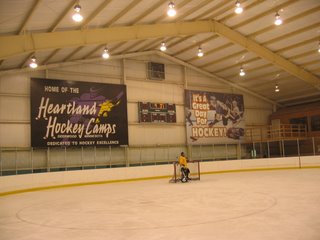
Some of my teammates on the bench. We were the yellow and white team.

Before I left camp, I received a panoramic photo of me and my fellow campers and coaches as well as a report card with ratings on my shooting speed, skating speed, and skills. Coach Jensen really gives you your money's worth!
Some things I need to improve on:
- Backward skating
- Forward-to-backward transitions and vice versa
- Stickhandling, stickhandling, stickhandling
- Backhand shot
- Shooting while moving on the ice
The priorities here are skating first, stickhandling second, and shooting last. I've heard many people say that the majority of being a good ice hockey player is skating and I agree. Fortunately, my forward skating, turns, and agility are pretty good. I just need to get better at backwards skating. If I do, maybe I can switch from forward to defense.
Needless to say, everyone (myself included) wanted to come back next year. One guy has been going to adult Heartland hockey camp for 13 years!
Goals for September
- Replenish emergency cash fund
- Eat more fruits and vegetables
- Read David Allen's book Getting Things Done
- Organize electronic files
- Add bookmarks to deli.cio.us
- Work out at least four days a week
- Start reading Physical Review Focus consistently.
Those are my non-academic goals. I won't have a good idea about the academic ones until the school year is further along.
In the pipeline, I'd like to teach a section or tutor spring semester. I would also like to build a Linux box once Debian etch is released (current release date: December 2006) and the new IBM Core 2 Duo chip drops in price.
Photos I had forgotten about
Link of the day: Kiva.org
12 August 2006
Link of the day: Imagining the Tenth Dimension
08 August 2006
Link of the day: Geothermal heating/cooling
Quote of the day: "I must study politics and war..."
The science of government it is my duty to study, more than all other sciences; the arts of legislation and administration and negotiation ought to take the place of, indeed exclude, in a manner, all other arts. I must study politics and war, that our sons may have liberty to study mathematics and philosophy. Our sons ought to study mathematics and philosophy, geography, natural history and naval architecture, navigation, commerce and agriculture in order to give their children a right to study painting, poetry, music, architecture, statuary, tapestry and porcelain.
I think this perspective is often lost on many parents. Some parents expect that since they worked hard and sacrificed, their children are responsible for perpetuating the family reputation and its economic status by becoming doctors, lawyers, entrepreneurs, etc. It is true that a parent's primary role is to provide for the children. But I hope that more parents will have the courage to trust their children and love them for who they are, rather than their efficiency in fulfilling their parent's wishes.
Our opportunities to study mathematics and philosophy are what separate us from rest of the animal kingdom. I'm not saying that if you're dumb, you should try to become a mathematician. But if that is your talent and desire, mathematics is no less noble and worthy than medicine or politics.
07 August 2006
Link of the day: Eye contact
Eye contact is one of many aspects to embodying confidence.
I became a more confident person in my last two years at college. And I realized that like eye contact, if you look like you're serious and know what you're doing, then you make a lot more progress with people. Nowadays, I occasionally have to be careful not to make too much eye contact because I seem intimidating. That's good when you're dealing with a mean character or bargaining, but not necessarily then you're trying to establish a working relationship or mentor someone.
When I became more confident, I noticed myself behaving differently. I made eye contact. I spoke up in class, sometimes without raising my hand (if I thought I had something important to say.) I asked questions. I spoke crisly and precisely and stopped using words like "I guess" or "Can I." I took the initiative to do what I thought was right, without asking for permission.
I don't remember consciously deciding to do these things. I just tried them and they seemed to work. Just like the man who discovered the power of eye contact.
04 August 2006
Link of the day: Senior faculty intimidation
Link of the day: Nanoscale views
A recent post discusses the hot topics in condensed matter.
29 July 2006
Link of the day: "It Never Gets Easier Than Now"
27 July 2006
Quote of the day: Floyd Landis on pain
Everybody thinks you can overcome pain if you want to enough, and let me tell you, you can't. This isn't some Jean-Claude Van Damme movie, where somebody can get shot in the leg and keep going. There's pain that makes me stop, makes everybody stop.
My parents always told me that will conquers everything, but I've learned that there is occasionally pain that you can't beat and that is perfectly human.
26 July 2006
Useful and cool Windows downloads
- Ccleaner - cleans out Windows system temporary files, browser cache files, and other garbage
- Copernic desktop search - indexes your hard drive so it can be searched easily (I was interested in being non-Google centric)
- Gaim - open source instant messanging client, an alternative to the ad-filled AOL Instant Messenger
- HDD Health - check your hard drive status via S.M.A.R.T.
- iColorFolder - color code your virtual folders on Windows
- O&O Defrag - a much better defragmenter than the one that ships with Windows XP (unfortunately not free, but there is a 30 day trial)
- Stamina - a touch typing tutor (I've been using it to learn Dvorak)
- Mars Exploration Rover Screensaver - nifty photos from NASA
21 July 2006
Link of the day: Albert Einstein and meandering rivers
19 July 2006
Link of the day: "When Amateurs Roamed the Earth"
It made me try to think of various "hobbies" that people must have done in the pre-transistor era. My list includes sports, music, tinkering, drawing (like in the New York Times article), and dancing. Maybe I should set a personal goal of putting some serious effort into the activities I haven't tried.
I've always loved sports and have some physical talent, so this one has always been easy for me to do and enjoy. As a child, I did a lot of playground sports and formally soccer and basketball, although nowdays I pretty much stick to hockey.
The playground sports included touch football, rounders (also known as kickball), prisoner dodgeball, sock out (also known as handball) and wall ball (I can't remember the name; you basically throw a tennis ball against the wall). I hope children still make up their own games. Looking back, I'm amazed at the rules we invented for sockout and wall ball. For example, if you played sock out against a wall, you could run under the ball's trajectory instead of hitting ("doing a rainbow"). In conventional sock out (with no wall, just a painted box for a boundary), an easy way for the "server" to "waste" someone (get a person out) was to do a "toilet" serve. Instead of bouncing the ball to the opposing player (what you do when you serve), you bounce the ball to your friend next to you, who hits the ball to the player low and fast (what we called a "skimmer").
I also watched football, basketball, baseball, soccer, and the Olympics on TV and read the sports page from front to cover.
As for music, I play the piano (not very well), but when I play my favorite piece (Arabesque No. 2 by Claude Debussy), people seem really impressed. I should thank my parents for forcing me to take music lessons. I've never taken any courses in music theory, but I think my exposure to classical music at an early age has given me some good taste (I hope). I really like listening bluesy music (but not Bach: why do so many people like Bach??) and playing Debussy piano pieces. I don't play piano much these days, but I do try to listen to a variety of music including classical, bluegrass, country, swing, some jazz, and a little pop/rock.
So I guess I have sports and music pretty covered. Tinkering is a hobby I'm working on. I think the most intimidating part of tinkering is the fear of breaking something. I'm finally getting over that fear and lately I've been trying to learn about operating systems and computer hardware. This seems like a good way to enter the field of tinkering since computers are relatively resilent and there's tons of information on the internet. I haven't tried building my own furniture, doing house improvement, or re-wiring my remote, but perhaps someday. One thing that helps is that my dad fixes a lot of stuff. Even though I usually didn't watch him, I think I inherited some building intuition from him.
Dancing and drawing are non-existent activities for me. I did draw as a child (I liked drawing famous athletes and Monkey King from the Chinese novel "Journey to the West"), but I don't have any formal art education and haven't got any intuition about art either. I always end up spending a lot of time in museums reading the descriptions on the exhibits because I have no idea why the art is important or what the context is. A friend of mine suggested that I just look at the work and make up my own mind about it, which is a good idea to some extent, but it would be much easier if I knew a bit more.
As for dancing, I don't really like dancing. Neither am I really good at it. The problem is that you have to memorize a complicated set of movements that happen in rapid succession and I have a hard time developing the needed physical memory. (Hmm, maybe parents should add dancing lessons to the requisite sports and music training.) So I guess this is at the bottom of my list. Maybe my sister (a dancing freak) will convert me in the near future.
06 July 2006
Writing: Bracket editing notation
But a simpler method is to use some kind of scripting language like the bracket (to physicists: not "bra-ket") notation system mentioned here. The advantage is that you don't need any special software or text editor.
I myself have used something similar, though I usually use different symbols for deletions and additions.
02 July 2006
Tech: Digital pen
29 June 2006
Link of the day: Interview with David Botstein
26 June 2006
Quote of the day: Conventional wisdom (Freakonomics)
It was John Kenneth Galbraith, the hyper literate economic sage who coined the phrase “conventional wisdom.” He did not consider it a compliment. “We associate truth with convenience,” he wrote, “with what most closely accords with self-interest and personal well-being or promises best to avoid awkward effort or unwelcome dislocation of life. We also find highly acceptable what contributes most to self-esteem.” Economic and social behavior, Galbraith continued, “are complex and to comprehend their character is mentally tiring. Therefore we adhere, as though to a raft, to those ideas which represent our understanding.”
22 June 2006
h number
I learned today about one promising measure called h number. As Eugene Wallingford explains, your h number is determined in the following way. Suppose you have n publications. Your h number is determined by having h publications with >= h citations each and (n-h) publications with < h citations each.
I won't bother to calculate my own h number since I have a mere two publications...
Link of the day: BumpTop
The creators of BumpTop try to emulate that feel in software. It's pretty cool, but I wonder what the graphics requirements are!
20 June 2006
Tom Brokaw's commencement speech
It's basically a call for young people to embrace tradition and to steer away from seductive on-demand entertainment world of music, internet, and video.
There are some major problems with Brokaw's speech. Parents expect their children to matriculate at great universities (like Stanford) and more importantly, they expect a return on their investment. A college education is damn expensive and you can't exactly go galloping off to Africa to help poor people if your parents paid $120,000 for college. What is the ratio of parents who desire their children to become lawyers and doctors versus the parents who want their children to work in a relief organization? Brokaw himself (ironically) states that today's grandfathers had their college education funded by the GI Bill.
I also find insulting Brokaw's insinuation that the majority of young people walk around oblivious to the world -- constantly wired to a virtual world. I'm just a few years older than the class of 2006 and I don't feel corrupted. There is certainly an infatuation period with new technology but it doesn't last for long. Young people have always spent their time in ways that disappoint their elders.
And I find it arrogant that Brokaw spends all his time discussing examples of public service that are related to going abroad. What about raising good children, building a community at the workplace, or just giving your best? The "small stuff" is just as important, maybe more so. Personally, I find it really dissatisfying to run any large operation with an iffy purpose. I'd rather accomplish minor, focused objectives and do them well. I think it's better to start a small-scale operation, to improve yourself and those around you first.
Opera 9 released!!
The widgets are kind of cute, but I'm not sure how useful they are. There is a nice weather widget and a Pandora widget. Apparently, widgets are a big hit in Mac OS X.
I really like the fast forward command. By pressing "SPACE", the browser will automatically search for the most likely "next" page. This seems to work for some sites (e.g. picture galleries and Tom's Hardware articles), but unfortunately, not on New York Times articles. Though imperfect, it still beats clicking or searching for the link "next".
There is now a trash can so that if you accidentally close a tab, you can retrieve it. You can also open webpages in the background. This is especially useful if you're reading the news and want to quickly scan a page (like Bloglines) and open a bunch of articles but not leave the page you're reading. It saves a lot of "CTRL-TAB"ing. The command is invoked by either middle-clicking, CTRL+SHIFT+click, or CTRL+SHIFT+ENTER on a link.
You can also save sessions! This is useful if you want to save all the tabs you opened and don't have time to read them at the moment.
A minor annoyance: I get confused now because to open a new tab, you use "CTRL+T" instead of "CTRL+N". I guess the change is to put Opera in line with other browsers like Firefox.
For more information about the new Opera 9 features, see this link.
19 June 2006
18 June 2006
Song of the day: "Ain't Nobody Here But Us Chickens"
One night Farmer Brown,
Was takin' the air,
Locked up the barnyard
With the greatest of care
Down in the henhouse
Somethin' stirred
When he shouted "Who's there?"
This is what he heard:
There ain't nobody here but us chickens
There ain't nobody here at all
So calm yourself,
And stop your fuss
There ain't nobody here but us
We chickens tryin' to sleep,
And you butt in
And hobble, hobble hobble hobble
With your chin
There ain't nobody here but us chickens
There ain't nobody here at all
You're stompin' around
And shakin' the ground,
You're kickin' up an awful dust
We chicken's tryin' to sleep
And you butt in
And hobble, hobble hobble hobble
It's a sin
Tomorrow
Is a busy day
We got things to do
We got eggs to lay
We got ground to dig
And worms to scratch
It takes a lot of settin'
Gettin' chicks to hatch
There ain't nobody here but us chickens
There ain't nobody here at all
So quiet yourself,
And stop your fuss
There ain't nobody here but us
Kindly point that gun,
The other way
And hobble, hobble hobble off and
Hit the hay
Tomorrow
Is a busy day
We got things to do
We got eggs to lay
We got ground to dig
And worms to scratch
It takes a lot of settin'
Gettin' chicks to hatch
There ain't nobody here but us chickens
There ain't nobody here at all
So quiet yourself,
And stop your fuss
There ain't nobody here but us
Kindly point that gun,
The other way
And hobble, hobble hobble of and
Hit the hay
"Hey boss man
What do ya say?"
It's easy pickens,
Ain't nobody here but us chickens
17 June 2006
Tech: Text editor "Cream"
15 June 2006
Song of the day: "Free" by Stephen Sondheim
From A Funny Thing Happened on the Way to the Forum
PSEUDOLUS:
I often thought,
I often dreamed how it would be--
And yet I never thought I'd be--
Once again.
HERO:
Free!
PSEUDOLUS:
But when you come to think of such things,
A man should have the rights that all others--
Can you imagine what it will be like when I am--
Can you see me?
Can you see me as a Roman with my head unbowed?
Sing it good and loud!
HERO:
Free!
PSEUDOLUS:
Like a Roman having rights and like a Roman proud?
Can you see me?
HERO:
I can see you.
PSEUDOLUS:
Can you see me, a reformer fighting graft and vice?
Sing it soft and nice!
HERO:
Free!
PSEUDOLUS:
Why, I'll be so conscientious that I may vote twice!
Can you see me?
Can you see me?
When I'm free to be whatever I want to be,
Think what wonders I'll accomplish then!
When the master that I serve is me and just me--
Can you see me being equal with my countrymen?
Can you see me being Pseudolus the citizen?
Can you see me being--give it to me once again--
HERO:
Free!
PSEUDOLUS:
Yes!
HERO:
Free!
PSEUDOLUS:
That's it!
HERO:
Free!
PSEUDOLUS:
Now, not so fast!
I didn't think--
The way I am,
I have a roof, three meals a day,
And I don't have to pay a thing.
I'm just a slave and everything's free.
If I were free, then nothing would be free!
And if I'm beaten now and then, what does it matter?
HERO:
Free!
PSEUDOLUS:
Can you see me?
Can you see me as a poet writing poetry?
All my verse will be--
HERO:
Free.
PSEUDOLUS:
A museum will have me pickled for posterity.
Can you see me?
HERO:
I can see you.
PSEUDOLUS:
Can you see me as a lover, one of great renown?
Women falling down--
HERO:
Free?
PSEUDOLUS:
No.
But I'll buy the house of Lycus for my house in town.
Can you see me?
Can you see me?
Be you anything from king to baker of cakes,
You're a vegetable unless you're free.
Such a little word, but oh, the difference it makes!
It's the necessary essence of democracy,
It's the thing that every slave should have the right to be,
And I soon will have the right to buy a slave for me.
Can you see him?
Well, I'll free him!
When a Pseudolus can move, the universe shakes,
But I'll never move until I'm free.
Such a little word, but oh, the difference it makes!
I'll be Pseudolus, the founder of a family,
I'll be Pseudolus, the pillar of society,
I'll be Pseudolus the man, if I can only be--
HERO:
Free!
PSEUDOLUS:
Sing it!
HERO:
Free!
PSEUDOLUS:
Spell it!
HERO:
F-r- double--
PSEUDOLUS:
No, the long way!
HERO:
F-r-e-e!
PSEUDOLUS and HERO:
Free!
13 June 2006
Virtual checklist
Rob Gonsalves paintings
Link of the day: Astronomy Picture of the Day
It seems like a nice idea, the physics analogy of the "one-word-a-day" method to building vocabulary.
12 June 2006
Physicists discuss tablet PCs
Quote of the day: David Milch, creator of Deadwood
The world does not begin or end with the expiration of any living thing. It just becomes an exercise in bitterness or self-congratulation.
- David Milch in response to the near cancellation of Deadwood
06 June 2006
Future project: Memory skills
Optimum level of cleanliness
For some additional perspective, you can read Malcolm Gladwell's article "The Social Life of Paper," which I have previously mentioned in this blog.
05 June 2006
Share your library online
Review: Ultimate Gretzky
The story of the "Great One" was really inspiring. It really drives home the point that you have to be passionate about what you do to be the best, and also a little selfish, but hopefully not too selfish.
Gretzky is certainly a classy athlete especially for a hockey player.
I also really liked watching the footage of Gretzky playing hockey in front of the TV with his mother as the goal keeper. And apparently, his dad would have him watch TV while following the puck with a pen on paper. His dad said that his goal was to develop Wayne's peripheral vision and that he doesn't believe in talent -- he thinks you can learn these skills.
I like to think of hockey and physics as very much the same thing. They both require competitiveness, persistence, drive, and mental toughness. Just like there is a Wayne Gretzky in hockey, it is possible to be successful in a competitive job without being a jerk. You don't have to become the bigshot scientist who drives his/her grad students to insanity and walks over his/her rivals.
04 June 2006
Link of the day: Are you a noisy complainer?
31 May 2006
Link of the day: Coccinella
Finance: Divide up big payments
A solution around this situation is to schedule (say monthly) payments to your savings account. If you have to pay $12000 in rent annually, put $1000 in your account per month. Then you won't have to worry. Better yet, set it up the deposits to happen automatically. Thanks for the tip from Lifehacker.
Tech: Keurig coffee maker
It is really nice. All you have to do is put some water in it. Then turn the machine on and it will take about 30 seconds to heat the water. Insert a "K-cup" (a pod containing ground coffee) into the machine and press the brew button. It takes just 10 seconds from there for the machine to make a cup of coffee for you! The serving size of a "cup" is 7 oz -- just right for me.
Whether or not the Keurig will turn out to be cost effective, I'm not sure. But I enjoyed being able to wake up on a Saturday and grab a cup of coffee right away.
28 May 2006
Kinkless GTD
Link of the day: Lab management
27 May 2006
Link of the day: Visualizing websites as graphs
If you run the applet on this site, there is one central node (probably the blog entry section) with lots of orange, green, and blue dots as is typical with a mostly text based site. I haven't yet figured out what is that offshoot node with the ball of orange dots around it (the lyrics of "Blow Gabriel Blow" with many line breaks?)

